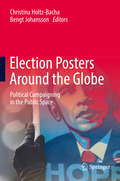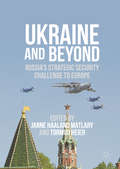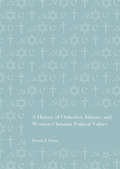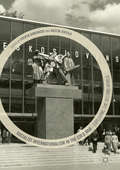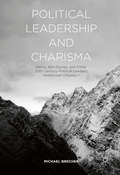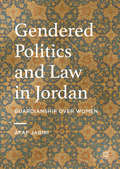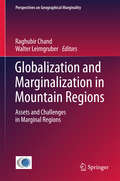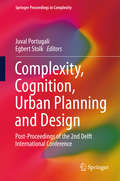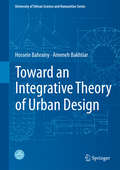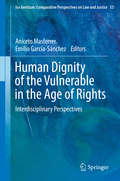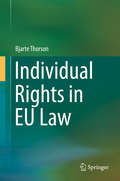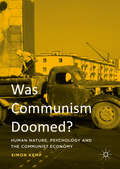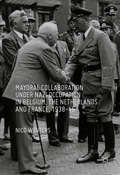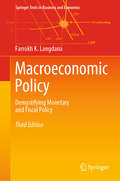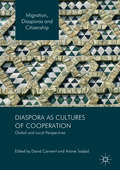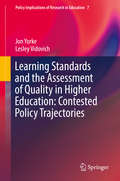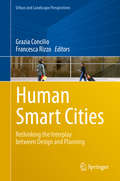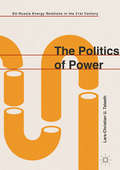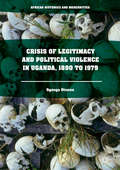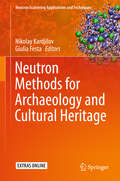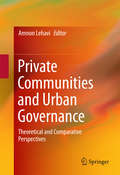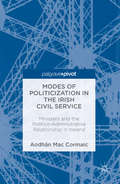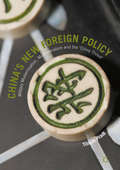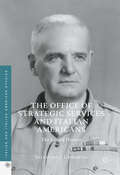- Table View
- List View
Election Posters Around the Globe
by Christina Holtz-Bacha Bengt JohanssonThis book examines the history and role of election posters as one of the most crucial forms of political communication, especially in electoral campaigns, in a number of countries around the globe. The contributing authors present comparative research on electoral posters from countries from all five continents, summarizing international similarities and national differences. The book also discusses theoretical aspects and different methodological approaches that are used for studying the design, content and reception of election posters as a means of political communication.
Ukraine and Beyond
by Janne Haaland Matlary Tormod HeierThis book is the first full-spectrum analysis of Russian and European norms of political action, ranging from international law, ethics, and strategy, to the specific norms for the use of force. It brings together leading scholars from these various fields, examining the differences in norm understanding between Russia and Europe. In light of the 2014 occupation and annexation of Crimea by Russia, and its subsequent covert participation in the internal affairs of Ukraine, including aggressive flying and major military exercises, Russia seems to be a classical revisionist power, intent on changing the balance of power in Europe in particular. It also reaches beyond Europe, inserting itself as the key actor in the Syrian war. The book therefore considers how we should understand Russia. It also questions whether or not the West, in particular Europe, responds adequately in this delicate and dangerous new situation. The book concludes that at present Russia acts strategically and with considerable success whereas Europe is reactive in its response.
A History of Orthodox, Islamic, and Western Christian Political Values
by Dennis J. DunnThe book reveals the nexus between religion and politics today and shows that we live in an interdependent world where one global civilization is emerging and where the world's peoples are continuing to coalesce around a series of values that contain potent Western overtones. Both Putin's Orthodox Russia and regions under the control of such Islamist groups like ISIS and Al Qaeda resent and attempt, in a largely languishing effort, to frustrate this series of values. The book explains the current tension between the West and Russia and parts of the Muslim world and sheds light on the causes of such crises as the Syrian Civil War, Russia's aggression against Ukraine, and acts of terrorism such as 9/11 and the ISIS-inspired massacres in Paris. It shows that religion continues to affect global order and that knowledge of its effect on political identity and global governance should guide both government policy and scholarly analysis of contemporary history.
Socialist Internationalism in the Cold War
by Patryk Babiracki Austin JersildThis volume examines how numerous international transfers, circulations, and exchanges shaped the world of socialism during the Cold War. Over the course of half a century, the Soviets shaped politics, values and material culture throughout the vast space of Eurasia, and foreign forces in turn often influenced Soviet policies and society. The result was the distinct and interconnected world of socialism, or the Socialist Second World. Drawing on previously unavailable archival sources and cutting-edge insights from "New Cold War" and transnational histories, the twelve contributors to this volume focus on diverse cultural and social forms of this global socialist exchange: the cults of communist leaders, literature, cinema, television, music, architecture, youth festivals, and cultural diplomacy. The book's contributors seek to understand the forces that enabled and impeded the cultural consolidation of the Socialist Second World. The efforts of those who created this world, and the limitations on what they could do, remain key to understanding both the outcomes of the Cold War and a recent legacy that continues to shape lives, cultures and policies in post-communist states today.
Political Leadership and Charisma
by Michael BrecherThis book is unique in illuminating and comparing the charismatic role of two political leaders, Jawaharlal Nehru and David Ben-Gurion, along with assessments of many other 20th century political leaders. Its aim is to enrich our knowledge of an important dimension of global politics: charismatic leadership. The central role of political leaders in shaping the behavior of states has been universally recognized since the political systems of antiquity in East Asia, the Middle East, and Europe. With the massive increase of independent states since the end of World War II, from 55 initial members of the United Nations to more than 200 today, and especially the emergence of awesome weapons of mass destruction, the centrality of political leaders in the survival of the planet has grown exponentially. Both India and Israel have experienced the crucial role of charismatic leaders, Nehru and Ben Gurion, who dominated their states and societies for a near-identical formative period in their political independence, 1947-64 and 1948-63 respectively, as charismatic leaders. Their impact, Brecher shows, extended far beyond their states to both their geographic regions and global politics.
Gendered Politics and Law in Jordan
by Afaf JabiriThis book analyzes how the state constructs and reproduces gender identities in the context and geopolitics of Jordan. It addresses the relevance of the state and its web of relations in understanding the politics of gender in the Middle East, rather than a cultural or religious explanation for women's subjugation. Guardianship over women is examined as not only the basis of women's legal and social subordination, but also a key factor in the construction and reproduction of a gender hierarchy system. The author probes how a masculine state gives power and legitimacy through guardianship to institutions-including family, religion, and tribe-in managing, producing, and constructing gender identity. Does the masculine institution succeed in imposing a dominant form of femininity? Or are there ways by which women escape and resist the social and legal construction of femininity? Based on over 60 case studies of contemporary women in Jordan, the book additionally examines how the resultant strategies and tactics developed by women in Jordan are influenced by and affect their status within the guardianship system.
Globalization and Marginalization in Mountain Regions
by Raghubir Chand Walter LeimgruberThis book looks at the global importance of mountain systems, emphasizing their ecological and socio-economic role in light of climate change and globalization. With a special focus on the Himalayas, it also examines the Czech-German-Austrian mountain borderland, the Alps, the Andes, the highland regions of Malaysia, and the Arctic. The contributors, specialists in their fields, all use an integrative approach that develops and argues the concept of mountain regions as a global common good. Readers also discover that mountain systems and mountain communities are often marginalized and left behind by the process of globalization. Case studies throughout detail the effects of climate change and global warming on both nature and local/regional societies, such as declining water supplies, a shifting vegetation line, and other important issues facing not only mountains but also the vast regions depending on them. In addition, the comprehensive coverage offers authenticated viewpoints from some of the most eminent explorers of Tibet in the nineteenth century. More than 50 percent of the global human population draws benefits directly or indirectly from mountain resources and services. This book provides practitioners, researchers, students, and other interested readers with a compelling look at the global importance of this imposing, yet sensitive ecosystem.
Complexity, Cognition, Urban Planning and Design: Post-Proceedings of the 2nd Delft International Conference (Springer Proceedings in Complexity)
by Juval Portugali Egbert StolkThis book, which resulted from an intensive discourse between experts from several disciplines - complexity theorists, cognitive scientists, philosophers, urban planners and urban designers, as well as a zoologist and a physiologist - addresses various issues regarding cities. It is a first step in responding to the challenge of generating just such a discourse, based on a dilemma identified in the CTC (Complexity Theories of Cities) domain. The latter has demonstrated that cities exhibit the properties of natural, organic complex systems: they are open, complex and bottom-up, have fractal structures and are often chaotic. CTC have further shown that many of the mathematical formalisms and models developed to study material and organic complex systems also apply to cities. The dilemma in the current state of CTC is that cities differ from natural complex systems in that they are hybrid complex systems composed, on the one hand, of artifacts such as buildings, roads and bridges, and of natural human agents on the other. This raises a plethora of new questions on the difference between the natural and the artificial, the cognitive origin of human action and behavior, and the role of planning and designing cities. The answers to these questions cannot come from a single discipline; they must instead emerge from a discourse between experts from several disciplines engaged in CTC.
Toward an Integrative Theory of Urban Design
by Hossein Bahrainy Ameneh BakhtiarThis book takes a bold epistemological approach to address the fundamental questions that urban design has faced since its inception - questions concerning its legitimacy, definition, nature, content, purpose, theory, methods, jurisdiction and above all its knowledge base. The appropriate level of urban design - global or local - is another critical and emerging question discussed. At the end, an integrative theory of urban design is introduced, on the basis of which a set of principles is developed for application by practicing urban designers. These principles are presented at three essential levels: general, global and local-Iranian. Toward an Integrative Theory of Urban Design is intended to dispel many of the ambiguities still troubling urban design as a discipline and profession.
Human Dignity of the Vulnerable in the Age of Rights
by Aniceto Masferrer Emilio García-SánchezThis volume is devoted to exploring a subject which,on the surface, might appear to be just a trending topic. In fact, it is muchmore than a trend. It relates to an ancient, permanent issue which directlyconnects with people's life and basic needs: the recognition and protection ofindividuals' dignity, in particular the inherent worthiness of the mostvulnerable human beings. The content of this book is described well enough byits title: 'Human Dignity of theVulnerable in the Age of Rights'. Certainly, we do not claim that only thehuman dignity of vulnerable people should be recognized and protected. Werather argue that, since vulnerability is part of the human condition, humanvulnerability is not at odds with human dignity. To put it simply, humandignity is compatible with vulnerability. A concept of human dignity which discards or deniesthe dignity of the vulnerable and weak is at odds with the real humancondition. Even those individuals who might seem more skilled and talented arefragile, vulnerable and limited. We need to realize that human condition is notlimitless. It is crucial to re-discover a sense of moderation regardingourselves, a sense of reality concerning our own nature. Some lines of thoughttake the opposite view. It is sometimes argued that humankind is - or is calledto be - powerful, and that the time will come when there will be novulnerability, no fragility, no limits at all. Human beings will become likeGod (or what believers might think God to be). This perspective rejects humanvulnerability as in intrinsic evil. Those who are frail or weak, who are notautonomous or not able to care for themselves,do not possess dignity. In this volume it is claimed that vulnerability is aninherent part of human condition, and because human dignity belongs to allindividuals, laws are called to recognize and protect the rights of all ofthem, particularly of those who might appear to be more vulnerable and fragile.
Individual Rights in EU Law
by Bjarte ThorsonThis book explores the EU law notion of 'individual rights'. It examines which sorts of rules grant EU legal rights to individuals, how it is decided if a right is conferred, and which individuals may claim the judicial protection of a right. It further discusses the legal implications and consequences of holding an EU legal right with respect to the interpretation and application of EU law in general and to specific remedies such as declaratory remedies, injunctions, restitution and damages. On a more overarching level, the book explores the question of how the idea of EU law rights relates to other fundamental EU law concepts such as the principles of effectiveness and direct effect, and discusses the legal stringency of the EU courts' 'rights language' in light of the overall aim of European integration. It thus contributes to the body of literature that aims to shed new light on the borders of the sui generis legal order that is EU law.
Was Communism Doomed?
by Simon KempThis book explores whether the ideology of communism was doomed to failure due to psychological rather than structural flaws. Does communism fail because there is not enough individual incentive and does it discourage psychological ownership? If so, does it produce learned helplessness and therefore empower evil? This book considers such questions, both with respect to how communism actually functioned and how it could have functioned using examples from Eastern Europe and the USSR itself during the 20th century. It reviews both the ideology of communism and its history, as well as the basic but difficult question of how one might decide whether an economic system can be defined as successful or not.
Mayoral Collaboration under Nazi Occupation in Belgium, the Netherlands and France, 1938-46
by Nico WoutersThis book explores the role of mayors in navigating the realities of living and governing under Nazi occupation. In Western Europe under Nazi occupation, mayors of villages and cities were forced into strategic cooperation with the occupier. Mayors had to provide good governance, mediate between occupier and populations, maintain personal legitimacy, and build local consensus. However, as national systems underwent authoritarian reform and collaborationists infiltrated administrations, local governments were gradually turned into instruments of Nazi control and repression. Nico Wouters uses rich new archival data to compare the realities of local government in three countries. Looking at topics such as food supply, public order and safety, forced labour, the repression of resistance, the persecution of the Jews and post-war purges, this book redefines our knowledge of collaboration, resistance and accommodation during Nazi occupation.
Macroeconomic Policy: Demystifying Monetary and Fiscal Policy (Springer Texts in Business and Economics)
by Farrokh K. LangdanaThis book is an applications-oriented text designed for individuals who desire a hands-on approach to analyzing the effects of fiscal and monetary policies. Significantly updated to provide an understanding of the post-financial crisis economy, the third edition covers the subprime crisis in detail, discussing monetary policies enacted in its wake, such as quantitative easing, tapering, carry trades, CMOs, and monetization. Even more globally oriented than previous editions, this volume links the Great Recession and US Monetary Policy to global hot capital flows and currency pegs. This edition also revisits the Eurozone in significant detail; discussing its history, its macroeconomic design challenges, and its present imperiled state, in the context of global macropolicy. Finally, this volume analyzes the "China syndrome" and explores the effects of slower trend growth in China on the rest of the world. India, with its different—almost supply-side—approach to macropolicy is also studied in detail. The third edition contains several brand-new cases and media articles that are carefully positioned to relate explicitly to theory, and to look ahead to and preempt global macro situations and polices in the years to come. MBA students and Executive MBA students who appreciate the importance of monetary and fiscal analysis will find this text to be right on target. Financial analysts and individual investors who need to strip away economic myths and jargon and systematically examine and understand the effects of macro policies on variables such as inflation, output, employment and interest rates, will also find the book extremely useful.
Diaspora as Cultures of Cooperation
by David Carment Ariane SadjedThis book examines the dynamic processes by which communities establish distinct notions of 'home' and 'belonging'. Focusing on the agency of diasporic groups, rather than (forced or voluntary) dispersion and a continued longing for the country of origin, it analyses how a diaspora presence impacts relations between 'home' and host countries. Its central concern is the specific role that diasporas play in global cooperation, including cases without a successful outcome. Bridging the divide between diaspora studies and international relations, it will appeal to sociologists, scholars of migration, anthropologists and policy-makers.
Learning Standards and the Assessment of Quality in Higher Education: Contested Policy Trajectories
by Jon Yorke Lesley VidovichThis book analyses accountability and quality policies relating to learning standards and examines their implications for assessment in higher education. Whilst primarily focusing on the Australian setting, this analysis is located within a broader frame of reference that includes the United Kingdom (UK), the United States of America (US), and the Organisation for Economic Cooperation and Development (OECD). Across these settings, comparative measures of learning have been seen as a policy 'solution' to the problem of 'proving quality' in a globalised and increasingly competitive higher education market. Comparative measures of learning depend on the specification of learning standards. Learning standards attempt to articulate the capabilities expected of graduates, and students' achievement of these is determined through the practices of assessment carried out within institutions. Quality policy, learning standards and assessment practices all intersect within the broader umbrella of accountability, with relevance to governments, higher education providers, employers, parents, and students. The findings reported in this book highlight a number of policy influences, including the rising demands for national and international comparative data on learning standards to compare quality and inform student choice in a globally competitive market.
Human Smart Cities
by Grazia Concilio Francesca RizzoWithin the most recent discussion on smart cities and the way this vision is affecting urban changes and dynamics, this book explores the interplay between planning and design both at the level of the design and planning domains' theories and practices. Urban transformation is widely recognized as a complex phenomenon, rich in uncertainty. It is the unpredictable consequence of complex interplay between urban forces (both top-down or bottom-up), urban resources (spatial, social, economic and infrastructural as well as political or cognitive) and transformation opportunities (endogenous or exogenous). The recent attention to Urban Living Lab and Smart City initiatives is disclosing a promising bridge between the micro-scale environments, with the dynamics of such forces and resources, and the urban governance mechanisms. This bridge is represented by those urban collaborative environments, where processes of smart service co-design take place through dialogic interaction with and among citizens within a situated and cultural-specific frame.
The Politics of Power
by Lars-Christian U. TalsethThis book sheds new light on the complex EU-Russia relationship, by providing the first comprehensive account of the EU-Russia Energy Dialogue. The author examines why Moscow and Brussels have failed to cooperate in this crucial area of interdependence. By invoking constructivism and Mikhail Bakhtin's concept of dialogue, and drawing on dozens of interviews with Russian and European officials, Talseth argues that the Energy Dialogue was unsuccessful because its interlocutors failed to come up with a common narrative for cooperation. Evidence suggests that the collapse of the Energy Dialogue was not pre-determined and initially there was a great deal of optimism and goodwill. Ultimately, the outcome of the Energy Dialogue was shaped by the unfolding time-space of Russo-European relations.
Crisis of Legitimacy and Political Violence in Uganda, 1890 to 1979 (African Histories and Modernities)
by Ogenga OtunnuThis book demonstrates that societies experiencing prolonged and severe crises of legitimacy are prone to intense and persistent political violence. The most significant factor accounting for the persistence of intense political violence in Uganda is the severe crisis of legitimacy of the state, its institutions, political incumbents and their challengers. This crisis of legitimacy, which is shaped by both internal and external forces, past and present, accounts for the remarkable continuity in the history of political violence since the construction of the state.
Neutron Methods for Archaeology and Cultural Heritage
by Nikolay Kardjilov Giulia FestaThis book provides an extensive overview of the application of neutron characterization techniques in cultural heritage to a broad audience and will be of interest to both scientists and non-scientists in the field. Archeologists, paleontologists, restaurateurs and conservators, historians and collectors will be fascinated by the wealth of information that can be obtained using neutron techniques, while material scientists and engineers will find details of the experimental techniques and materials properties that can be determined. Neutrons, due to their weak interactions with materials, provide a penetrating, but non-invasive probe of bulk properties. They allow the characterization of the composition and mechanical properties of materials, helping to answer questions related to the dating, the manufacturing process or the state of degradation of artefacts. They allow detailed interrogation of the internal structures of objects that may be otherwise hidden from view. The first section of the book is dedicated to stories describing spectacular discoveries brought about by the use of neutron techniques in a range of applications. The second section covers the experimental techniques in appropriate detail: basic principles, limitations and fields of application.
Private Communities and Urban Governance
by Amnon LehaviThis book offers an interdisciplinary and comparative study of the complex interplay between private versus public forms of organization and governance in urban residential developments. Bringing together top experts from numerous disciplines, including law, economics, geography, political science, sociology, and planning, this book identifies the current trends in constructing the physical, economic, and social infrastructure of residential communities across the world. It challenges much of the conventional wisdom about the division of labor between market-driven private action and public policy in regulating residential developments and the urban space, and offers a new research agenda for dealing with the future of cities in the twenty-first century. It represents a unique ongoing academic dialogue between the members of an exceptional group of scholars, underscoring the essentially of an interdisciplinary and comparative approach to the study of private communities and urban governance. As such, the book will appeal to a broad audience consisting of policy-makers, practitioners, scholars, and students across the world, especially in developing countries and transitional and emerging economies.
Modes of Politicization in the Irish Civil Service
by Aodhán Mac CormaicThis book presents a study of the relationship between Cabinet-level Ministers and top civil servants in Ireland. The nature of this relationship can potentially have far-reaching effects on people’s lives as it can influence the type of public policy agreed at top levels of government. A total of sixteen interviews were carried out for the research, eight with retired Cabinet-level Ministers and eight with retired Secretaries General of Irish government departments. Anonymity, not just for the participants but also for the government departments in which they had served, was vital to the success of the research. Also vital was the fact that only retirees were interviewed as this removed the fear for participants that their careers might suffer if they spoke too frankly. The result is a collection of interviews containing frank and open views on the relationship between Ministers and their officials and on how this relationship influences public policy development.
China’s New Foreign Policy: Military Modernisation, Multilateralism and the ‘China Threat’
by Tilman PradtThis book analyses how China overcame its meagre reputation in the early 1990s to become an aggressively growing military power and rising threat to the international system. The author focuses on China's new multilateral foreign policy approach, ambitious military build-up programme and economic cooperation initiatives. This book presents a much-needed comparative perspective of China in terms of foreign policy, seeking to develop analytical tools to assess China's motivations and moves. The author suggests that understanding China's new foreign policy, its tactics in multilateral organisations, and approaches to conflict resolutions are elementary to grasp the new realities of international relations, particularly relevant to newly established institutions in the evolving Asian political system which require basic knowledge for analysing the politics in this continent. This book uses an innovative approach, a qualitative analysis of China's foreign policy addressing criteria of reputation management, to overcome the perceived 'China threat'.
The Office of Strategic Services and Italian Americans
by Salvatore J. LaguminaThis book explores the contributions of Italian Americans employed by the Office of Strategic Services (OSS) during World War II. Italian Americans fluent in Italian language and customs became integral parts of intelligence operations working behind enemy lines. These units obtained priceless military information that significantly helped defeat the Axis. They parachuted into frozen mountains tops to link up with Italian guerilla units in northern Italy or hovered in small patrol torpedo boats and row boats across the Mediterranean Sea in pitch black darkness to destroy railroad junctions.
Nuclear Proliferation in South Africa
by Lucky E. Asuelime Raquel A. AdekoyeThis book investigates drivers and trends in nuclear proliferation in the Global South. Based on an in-depth analysis of South Africa's nuclear history, it examines general causes of proliferation, such as technical capabilities and constraints; a country's motivation to build a nuclear bomb; and particular domestic and international situations. It also highlights Britain's role in the development of technological capability in South Africa and explains how nuclear weapons influence international relations. Finally, the study offers effective solutions to the problem of nuclear proliferation in developing countries.
